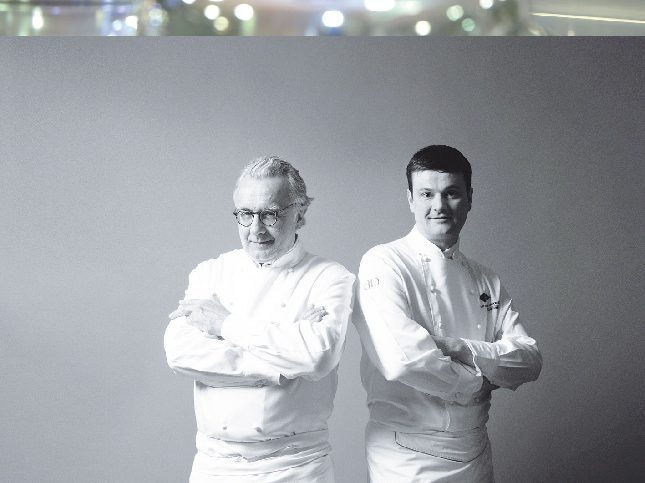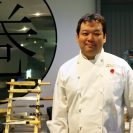From the age of eighteen Chef Jocelyn Herland (JH)has trained as a chef, spent a year training in the front of house, worked in pastry and built his career in Michelin Star kitchens. In 2007 he became the Head Chef of the Alain Ducasse restaurant at The Dorchester. Within two years of opening the restaurant JH and his team have achieved a culinary experience worthy of the coveted 3 star Michelin rating.
I was fortunate enough to get to know Chef Jocelyn while I was working at the Dorchester Hotel. His kitchen is beautifully designed and runs like a well oiled machine. I knew that an interview with him would be a learning experience, and it was.
During our interview he told me how all his experiences have given him an all round understanding of how a restaurant works both in terms of operations and as an experience for the guest. He believes a chef must understand the guests and how they think, they must see the whole picture, the whole experience and only then can they truly please the guests.
Throughout our chat I was captivated by his knowledge of culinary history. He began talking about the origins of the modern restaurant and explained how restaurants such as Tour D’Argent (established in 1582) laid the foundations for restaurants today in terms of structure, operations and dynamics. He explained how as chefs have become more popularised in the media, and the focus has turned more to the food and the chef’s style rather than the overall experience. In turn, many chefs now have too much self importance and put their own desires and preferences above that of the guest’s pleasure. The Maitre D’hotel position was once the definitive element in a restaurant’s success; this role in the restaurant was charged with creating the dining experience and focused on the details which distinguished the restaurant from its competitors. During that time there was a greater focus on the overall guest experience and the spectacles created in the dining room rather than the actual culinary experience. In today’s world the focus has shifted more and more towards the food served and the chefs working in the kitchen.
According to JH this shift of power is the root of much of the conflict that generally exists between the front of house and chefs.
JH believes that chefs must understand their guests and think like them in order to fuse their passion with the guests’ satisfaction. In his opinion, too many young chefs do not have an appreciation of this concept. Too many chefs these days are working for themselves, to develop a CV that looks like a who’s who of the restaurant industry, rather than focusing on learning, contributing to the team and pleasing the guest.
He went on to talk about the importance of greater team work in the kitchen. He believes a team must grow together and share knowledge amongst themselves. Staff turnover in kitchens is generally too high and this impacts on the operation. For him, the role of a head chef is as a cook, a manager and a teacher, responsible not only for the evolution of the food and restaurant but for the team too. A head chef must earn their staff’s respect by treating them fairly and dedicating time to teaching them. It is also important for the head chef to demonstrate a range of skills that he then teaches his staff.
I sat with Chef Jocelyn in the beautiful setting of his restaurant’s dining room for the following interview.
Why did you decide to become a chef?
I grew up in a family that loves food. I have always loved cooking as it allows you to share your passion and please people. I started my career in a large brassiere, le grand café capucine, we would cook for 900 guests a day, it was a 24/7 operation. This type of operation taught me to work hard and be consistent in my work. I learnt all the practicalities of being a chef which you are not taught in school. It was here that I began to develop an understanding of the real passion for being a chef.
What was your first big break?
It was the job at le grand café capucine brassiere. Through working with the team there I began to hear about, and have my eyes opened to the world of Gastronomic cuisine. I started to hear about famous chefs many of who have been influenced by Mr. Bocuse (Chef Paul Bucose). He is one of the first chefs to come out of the kitchen and represent his restaurant and the industry to the world.
Who has been your biggest influence?
My first head chef in a gastromonic kitchen, Jean Marie Meulien. I respected his talent as a chef, his ability as a cook and his fairness as a person. I was impressed by his knowledge of the kitchen and the respect he commanded from his team. He gave me opportunities to grow and learn in the kitchen that are not afforded to apprentices in most kitchens.
What is your greatest achievement to date?
The greatest achievement in my life is being able to balance my family life with my career. It is very important that a chef has balance in their life if they wish to succeed and have longevity in their career. When it comes to culinary achievements it would have to be when my team and I received our third Michelin Star here at the Dorchester Hotel.
What do you believe are the biggest misconceptions about being a chef and why?
The perception that a chef is a job for the unskilled.It was not respected as a profession. Over time this perception has changed, largely due to figures like Mr. Bucose (Chef Paul Bucose) coming out of the kitchen and being more active in promoting his restaurant and the professionalism that comes with this job, he inspired a whole generation of chefs. The media has done a lot to promote certain chefs to a celebrity status, raising the general awareness about this line of work. The problem is people still are not aware of the difficulty and realities of being a chef. Nowadays you have too many young chefs who get into the industry with stars in their eyes, with an attitude of wanting to become a celebrity chef without understanding the journey they must undergo if they have a chance of reaching the top.
What future challenges and developments do you foresee in the restaurant business?
There is a growing conscious awareness by the guest about the sources of food produce. Guests are becoming more aware of issues such as sustainability, responsible farming and fishing as well as the advantages of locally sourced produce. Although the guest is more aware of these issues they have not compromised on their expectations with regards to demanding variety. We are basically spoilt by choice when we shop in the super market or eat at most restaurants as we get so much imported produce in the UK. I have a parable about my grandfather, who as a child received an orange for Christmas from his mother, in his time a simple orange was fascinating as they were so rare. He never actually ate the orange, instead he just watched in amazement as it dried. Nowadays I eat an orange a day, and I expect it to be in the supermarket when I shop regardless of the season, otherwise I’ll just go to another supermarket that sells them. This creates a major dilemma and challenge for chefs in fine dining restaurants. They must decide on how to provide a variety of top quality ingredients in a dish while trying to adhere to the code of social responsibility.
Who would you like to cook a meal for?
My grandmothers, as I never had the chance to. They influenced me in my youth and I would love to share my passion for cooking with them.
What do you cook for your family at home?
I like to just open the fridge and put together something tasty that we will all share together as a family and enjoy the moment. I can tell you my son prefers his mothers pasta, I tend to over cook it at home because I’m always going around doing other stuff around the house and playing with him!
What is your view of Middle Eastern cuisine?
I used to work at The Royal Monceau (the 5 star Hotel which is a Parisian Palace) where we had many Arab guests, so I worked with Lebanese and Syrian chefs there. I liked the foods they made especially the fresh stuffed vine leaves. It was also very interesting to see a range of ingredients which we don’t use in the French kitchen like Tahini (sesame seed paste) and the way in which they used spices, roasting them first to release all the aromas and flavours.











